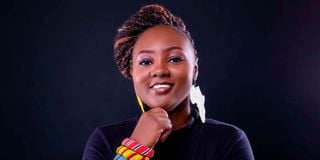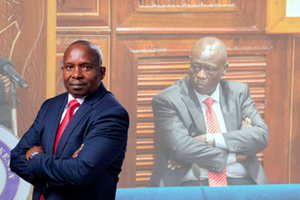Using film to advocate for mental health

Noella Luka is a Nairobi-based documentary filmmaker and mental health advocate.
Noella Luka is a Nairobi-based documentary filmmaker and mental health advocate. Her work has received recognition and has been screened in Africa, Europe, and North America.
Noella has worked as a producer and director for Kenyan shows such as Tazama, Project Green, and Giving Nature A Voice. She directed the multi-award-winning documentary Vanishing Vultures, which premiered at the Zanzibar International Film Festival, is available on VOD at Demand Africa, and was featured at the MIPCOM TV market in Cannes in 2019.
Noella is the Team Lead of Mental Voices Africa, a mental health support group that empowers people with mental illnesses to share their stories. This sparked her current project, "What's Eating My Mind", a personal film that captures the lived realities of mental illness within Kenyan families. The project is a co-production between LBX Africa and STEPS.
Your latest project is a really personal and intimate portrayal of mental health as a Kenyan woman. Was it hard for you to share something so close to your heart?
I feel like the film itself, particularly the topic, is hard, and in the past, a lot of it has been shared from different perspectives. But a lot of weight has been given to professionals - scientific experts to be precise - and has, in many ways, overlooked people like me (people who actually go through the motions of depression or mania every single day as lived experience experts) and yet our voice matters.
I felt the need to have representation from an African perspective. It was hard to speak to some of the things like religion, African traditions and grief, but I believe that this is an important journey that has matured with time. It has taken four years of filming and two years before that to kind of understand myself as a person, understand the mental health space in Kenya, the dynamics and importance of having a support group, and having people like me as friends who also have their own individual journeys and were willing to share.
Do you feel like most art is personal, or that it has to be personal to be good?
Art is subjective and is dependent on the artist. Personally, I felt being part of the story gave a human face to it and helped the story. Being vulnerable opened up a world where the audience can be part of my journey, and that of my friend Nick, who also features in the film, experiencing how our world is through our eyes as the film moves forward.
The need to be personal was because there was a gap in how people with lived experience with mental illness are portrayed. Having an intimate portrait therefore, of my experiences, it not only portrays how society perceives us, but also gives a voice to the experiences we go through.
What was your journey into film for those who haven't watched the project? Where can people watch it now and what do you think the stark differences are between practicing film abroad and at home?
My journey into film started straight out of high school working in a news agency when I was about 19, and it opened me to knowing that everyday life is important. The film shows my journey as a storyteller working in a local news station as a reporter telling human interest stories, but (they) were never given as much attention as politics or current affairs. That is where my interest came from. I felt as if I needed to go to film school to nurture the craft because I wanted to get to understand how to tell in depth stories, learn the diversity of it. I applied to film school and got a partial scholarship to study filmmaking in the US. While I was there, after my first semester, I was in a psych ward, so I decide to pursue both extremes: film, and my mental health journey.
The film is available online on BBC Africa’s YouTube page
What do you think the stark differences are between practicing film abroad and at home?
I was in the US for seven months and was able to immediately get a job at the school’s production company as an associate producer based on my work experience in Kenya. In class, even though I was there for one semester and a few days of the second semester, I immediately had access to film equipment; the classes where very hands on, and every weekend we had an assignment that enabled us to go to the field. I also had a film partner for my thesis project and we would constantly get visiting lectures from filmmakers in the industry, most of whom were alumni.
At home there is a lot of theory. Documentary film is growing in Kenya, but we still rely on a lot from abroad in terms of mentorship and honing the craft.
Comment on the support systems you have found in Kenya for those suffering from mental health issues.
We do have support groups in the mental health space. I’m lucky to be part of different support groups including the one Nick (the other protagonist in the film) is a part of called Mental Voices Africa. We are also part of other online support groups as well Users and Survivors of Psychiatry and Bipolar Kenya. I feel that the support groups are very niche and also feel that others who are seeking help need access. This is something we are working on.
How did your family react to your diagnosis and is there such a thing as support systems for support systems - for those who don't really know how to deal with loved ones who are struggling?
My initial diagnosis in 2016 was unspecified bipolar and both my family and I did not know what that meant. It was a journey of trying to figure out how best to move forward. A lot of it had been trying to find the right support systems and information on where to start.
I remember asking my counsellor once, “I come to you every other week and talk to you about what I’m going through. As a counsellor, do you have a support system?” and she said yes. I believe counsellors have structured support.
I also like to mention that caregivers - the people who take care of us - my family, dad and siblings also need to be part of a support system and also be part of a community where they can speak about issues they’re going through and not feel like they are alone because the essence of having a support system is just knowing that you are not alone.
In the support system Nick and I are part of, Mental Voices Africa, we do have a parent of a member that has a mental illness. By being part of the support group, they get to hear from others’ experiences, know that what they are going through with their loved one is not unique to them. It helps to understand her better.
Is there something you wish someone had told you before your diagnosis - something that would have made you aware sooner, something that wouldn't have made you feel alone, or made you feel like you're 'crazy'?
It would have been great to know what my diagnosis meant because it was really hard for me and my family in the beginning.
The first time I left hospital, I stopped taking medication simply because I did not know what my diagnosis was and what it meant. The medication was too strong, and my body started feeling different, and that’s why I stopped taking it. Understanding what I was experiencing, good or bad, and how to move forward, and being made to feel human despite the stigma attached to mental illness would have been really important.
I needed to know that there are coping mechanisms, there are support groups. All this I found out when I returned to Kenya.
What is your next project going to focus on and what is the last good Kenyan production you watched?
I feel that there are gaps in the mental health space with storytelling which I’m inevitably going to be part of because of my condition and life experience. But I still want to tell other African stories and explore other different genres because there is a gap in Africans telling their own stories in their own voice.
I was at a film event recently and really enjoyed the films at ‘Shorts, Shorts and Shots’ held by DocuBox. I watched several African films that spoke to the diversity of us as Kenyans and Pan Africans, but I really liked a one take short film called ‘Jumapili Njema’ directed by Beather Mwakyenda that reminds me of a film released in 1980 called The Shining, directed by Stanley Kubrick.





